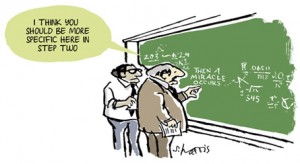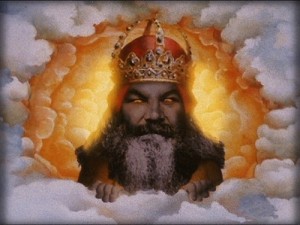From the Psalms:
Lord, you have searched me out and known me;
you know my sitting down and my rising up;
you discern my thoughts from afar.
You trace my journeys and my resting-places
and are acquainted with all my ways.
Indeed, there is not a word on my lips,
but you, O Lord, know it altogether.
You press upon me behind and before
and lay your hand upon me.
Such knowledge is too wonderful for me;
it is so high that I cannot attain to it.
Where can I go then from your Spirit?
where can I flee from your presence?
If I climb up to heaven, you are there;
if I make the grave my bed, you are there also.
If I take the wings of the morning
and dwell in the uttermost parts of the sea,
Even there your hand will lead me
and your right hand hold me fast.
(From the Daily Office Lectionary – Psalm 139:1-9 (BCP version) – February 23, 2013.)
 A few days ago I wrote about my interest in superstring theory, m-theory, and the multiverse concept which springs from my life-long love of science fiction and the especially the “alternate reality” sorts of tales. I suggested that Jesus’ miracles might have been accomplished by his somehow accessing an alternate reality to affect this world; that would imply some sort of access to knowledge of those other universes.
A few days ago I wrote about my interest in superstring theory, m-theory, and the multiverse concept which springs from my life-long love of science fiction and the especially the “alternate reality” sorts of tales. I suggested that Jesus’ miracles might have been accomplished by his somehow accessing an alternate reality to affect this world; that would imply some sort of access to knowledge of those other universes.
I’ve never believed that the human Jesus had access to the divine mind in that way, so I’m not sure how I feel about that implication. Or maybe a spiritual connection to another reality doesn’t require that; perhaps that sense of and access to a healthier reality is what the Celts are onto with their idea of a “thin place”. Perhaps there are places where the divisions between the universes are permeable, and perhaps there are people who, like Jesus can sense that, and draw the realities together. Perhaps the ability to do this is what Jesus promised his disciples when he said, “If you do not doubt in your heart, but believe that what you say will come to pass, it will be done for you. So I tell you, whatever you ask for in prayer, believe that you have received it, and it will be yours.” (Mark 11:23-24) I know that’s a lot of “perhapses” . . . . but that’s part of what meditation is all about, imagining the possibilities.
And it is possibilities and alternate realities, and the question of God’s knowledge of them, that grab my attention today as I consider the evening psalm. The psalmist sings of God’s knowledge, which is all encompassing; God’s understanding of the psalmist’s existence is inescapable. In theology this is call “omniscience”; God is described as “all knowing.”
If there is only a universe, a single reality, this would mean that God knows the past, the present, and the future of the one-and-only timeline, and this gives rise to the doctrine of predestination, a sort of determinism: if God knows ahead of time what will happen, then events in the universe are effectively predetermined from God’s point of view. I have a lot of difficulty with predestination because, if it is true, then Jesus promise that “the truth will make you free” (John 8:32) is hollow. There is no freedom in a single universe whose future is determined.
But what if m-theory is right and there are alternative realities, an infinity of them? What if what God “knows” is not the future of a single reality, but all the multiplicity of possible outcomes? What God “knows” in that case is not what must be, but what might be. God knows, for example, what will become of Schrödinger’s cat . . . in every possible outcome there may be.
The multiverse theory is much too complicated to lay out in a brief theological reflection (and I’m certainly not the theoretical mathematician who could do so, in any case), but at its highest level it simply postulates that any universe that is mathematically possible has equal possibility of actually existing: if the physicists and mathematicians can get it to work out on paper, even if it can’t exist in this universe, it would exist “somewhere”. And, I would suggest, the God of possibilities would know about that universe.
God’s omniscience over a multiverse reality truly is “too wonderful for me.” It is also, from my point of view, much more exciting than any deterministic, single-universe idea that God simply knows the future of a solitary timeline. It means that God is the God of possibility. “For God all things are possible,” said Jesus (Matt. 19:26) And again, “What is impossible for mortals is possible for God.” (Luke 18:27) And again, “Abba, Father, for you all things are possible.” (Mark 14:36)
Søren Kierkegaard wrote, “Inasmuch as for God all things are possible, it may be said that this is what God is: one for whom all things are possible . . . God is that all things are possible, and that all things are possible is the existence of God.” (The Sickness Unto Death) For Kierkegaard, human existence is not confined to the known, to one concrete, “factual” reality; a multitude of possibilities is fundamental to human life. The human soul is released by possibility; it is possibility that makes us free.
Superstring theory, m-theory, the multiverse hypothesis . . . these are the new science of possibility. Our omniscient God is the God of possibility. And possibility is the truth that sets us free! That is just too wonderful!
====================
A request to my readers: I’m trying to build the readership of this blog and I’d very much appreciate your help in doing so. If you find something here that is of value, please share it with others. If you are on Facebook, “like” the posts on your page so others can see them. If you are following me on Twitter, please “retweet” the notices of these meditations. If you have a blog of your own, please include mine in your links (a favor I will gladly reciprocate). Many thanks!
====================
Father Funston is the rector of St. Paul’s Episcopal Church, Medina, Ohio.

 My late brother had a cartoon cut from some magazine taped to the door of his university office (he was a professor of political science and constitutional law) for years. I suspect it came from either Playboy or The New Yorker, but I really don’t know. It depicted two scientists working at a chalk board. To their left on the board was a complicated looking mathematical formula and to their right, another one. Connecting the two sets of numbers were arrows drawn from and to the words, “The a miracle occurs.” One of the scientists speaking to the other says, “I think you should be more specific here in step two.” (Of course, I’ve been able to find the cartoon on the internet and will post it with this meditation.)
My late brother had a cartoon cut from some magazine taped to the door of his university office (he was a professor of political science and constitutional law) for years. I suspect it came from either Playboy or The New Yorker, but I really don’t know. It depicted two scientists working at a chalk board. To their left on the board was a complicated looking mathematical formula and to their right, another one. Connecting the two sets of numbers were arrows drawn from and to the words, “The a miracle occurs.” One of the scientists speaking to the other says, “I think you should be more specific here in step two.” (Of course, I’ve been able to find the cartoon on the internet and will post it with this meditation.) For many years, I have rather liked Paul’s citizenship metaphor for our participation in the household of God. It made sense . . . but I’m not sure it makes sense any longer because I’m not sure we understand any longer what citizenship is!
For many years, I have rather liked Paul’s citizenship metaphor for our participation in the household of God. It made sense . . . but I’m not sure it makes sense any longer because I’m not sure we understand any longer what citizenship is! Every so often something in Holy Scripture speaks to me of something other than the “purely” spiritual or “only” religious . . . and this little piece of the Letter to the Hebrews is one of those bits: “what is seen was made from things that are not visible.” Right!
Every so often something in Holy Scripture speaks to me of something other than the “purely” spiritual or “only” religious . . . and this little piece of the Letter to the Hebrews is one of those bits: “what is seen was made from things that are not visible.” Right! 
 Well, there it is! Bigger than life! Free will! Of course, I know that as an Anglican I am not supposed to use this text, or any part of the Deuterocanon, to settle matters of doctrine, but only read them ” for example of life and instruction of manners.” [Articles of Religion, Article VI, BCP 1979, page 868] But come on! There it is!
Well, there it is! Bigger than life! Free will! Of course, I know that as an Anglican I am not supposed to use this text, or any part of the Deuterocanon, to settle matters of doctrine, but only read them ” for example of life and instruction of manners.” [Articles of Religion, Article VI, BCP 1979, page 868] But come on! There it is! The Book of Judith is part of the Apocrypha or Deutercanon, those books accepted as Holy Writ by part of the Old Testament by Roman Catholic and Eastern Orthodox Christians, but rejected by Protestants and by rabbinic Judaism. As Anglicans, we Episcopalians adopt the position taken in the 39 Articles of Religion: they are the “other Books the Church doth read for example of life and instruction of manners; but yet doth it not apply them to establish any doctrine.” (Art. VI, BCP 1979, page 868)
The Book of Judith is part of the Apocrypha or Deutercanon, those books accepted as Holy Writ by part of the Old Testament by Roman Catholic and Eastern Orthodox Christians, but rejected by Protestants and by rabbinic Judaism. As Anglicans, we Episcopalians adopt the position taken in the 39 Articles of Religion: they are the “other Books the Church doth read for example of life and instruction of manners; but yet doth it not apply them to establish any doctrine.” (Art. VI, BCP 1979, page 868)
 A later selection from the Book of Job was called up by the Sunday Eucharistic Lectionary several weeks ago. In my sermon I said to the congregation that the Book of Job is fiction (which it is). You should have seen the look on one of my parishioners’ face! There’s a fellow in the congregation who is, shall we say, conservative with regard to the Bible. While I don’t believe he actually considers the Bible to be the inerrant word of God per se, he’s pretty sure that it is to be taken with the highest degree of certainty and words like “myth” or “fiction” applied to Scripture are not to his liking. I swear I thought he might have an apoplectic fit right there in his pew! But let’s be honest: do we really think that God and Satan are engaged (or have ever been engaged) in a game of chance involving the lives of human beings?
A later selection from the Book of Job was called up by the Sunday Eucharistic Lectionary several weeks ago. In my sermon I said to the congregation that the Book of Job is fiction (which it is). You should have seen the look on one of my parishioners’ face! There’s a fellow in the congregation who is, shall we say, conservative with regard to the Bible. While I don’t believe he actually considers the Bible to be the inerrant word of God per se, he’s pretty sure that it is to be taken with the highest degree of certainty and words like “myth” or “fiction” applied to Scripture are not to his liking. I swear I thought he might have an apoplectic fit right there in his pew! But let’s be honest: do we really think that God and Satan are engaged (or have ever been engaged) in a game of chance involving the lives of human beings?

